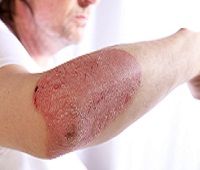Article
Novel Psoriasis Treatment Demonstrates Safety and Efficacy
Author(s):
Ponesimod, a selective S1P1 receptor agonist, has been shown to be efficacious for improving both disease and quality of life markers in patients with moderate to severe chronic plaque psoriasis.

Ponesimod, a selective modulator of the sphingosine 1-phosphate (S1P) receptor 1 S1PR1), has been shown to be efficacious for improving both disease and quality of life markers in patients with moderate to severe chronic plaque psoriasis, according to a study published recently in The Lancet.
S1PR1 exists on the surface of T lymphocytes and controls “the egress of these cells from lymph nodes into blood,” explained Daniele D'Ambrosio, MD, PhD, Senior Director and Clinical Program Head of Autoimmunity in Clinical Science for Actelion Pharmaceuticals Ltd. in Switzerland. “There is evidence indicating that pathogenic T cells become activated in the lymph nodes and subsequently migrate through blood into the skin of patients with psoriasis to cause the formation of psoriatic plaques. By functionally blocking S1PR1, ponesimod may prevent the recruitment of pathogenic cells into the skin of patients with psoriasis, leading to resolution of the plaques.”
The phase 2, double-blind, randomized, placebo-controlled, parallel-group, multicenter study conducted by D’Ambrosio and colleagues randomized eligible patients in two periods. The first randomization period (the induction period) grouped patients in a ratio of 1:2:2 to receive oral placebo, 20 mg ponesimod, or 40 mg ponesimod. Patients who had achieved at least a 50% reduction in Psoriasis Area and Severity Index (PASI) scores from baseline by Week 16 were eligible to enter the maintenance period (Weeks 16—28). Patients in the placebo group continued to receive placebo during this time. Patients in the ponesimod 20 mg and 40 mg groups were re-randomized in blocks of four to receive ponesimod at the same dose as in the induction period or placebo, in a 1:1 ratio, according to the article on the study in The Lancet.
The primary efficacy endpoint was a 75% reduction in PASI scores from baseline, with a secondary endpoint of a score of 0 or 1 on the Physician’s Global Assessment (PGA) at Week 16, according to the article in The Lancet. Quality of life was assessed using the Dermatology Life Quality Index (DLQI). The researchers also recorded adverse events (AEs), including serious AEs.
The greatest improvements were seen among patients in the 40 mg ponesimod group, according to the results in The Lancet. At Week 16, PASI 75 was achieved by 64 patients (48.1%) in the 40 mg group, compared to 58 (46%) patients in the 20 mg group and nine (13.4%) patients receiving placebo. A higher proportion of subjects receiving the 40 mg dose of ponesimod (33 patients, or 24.8%) achieved PASI 90 by Week 16 compared to 18 (14.3%) patients in the 20 mg group and two patients (3%) on placebo. By the same time period of Week 16, PGA scores of zero or one were seen in 43 patients in the 40 mg ponesimod group (32.2%), 35 patients (27.8%) in the 20 mg group, and three (4.5%) in the placebo group. Mean change from baseline in DLQI scores, compared to placebo, were -3.4 (95% confidence interval [CI] -5.2 to -1.6) for the 20 mg ponesimod group and -3.7 (-5.6 to -1.9) for the 40 mg ponesimod group.
“Our study showed that ponesimod treatment was able to reduce skin manifestations in patients with moderate to severe psoriasis and improve patient's perception about their disease and quality of life,” D’Ambrosio explained. “The magnitude of the benefits observed with ponesimod appeared to be in the range of those seen with Enbrel, one of the most commonly prescribed injectable drugs, and compared favorably to oral therapies that are currently available or in late stage of development for psoriasis. Additionally, ponesimod seemed to improve the joint pain associated with psoriatic arthritis in the subgroup of patients in our study who had this condition. Ponesimod showed a good tolerability and a promising safety with no indications of cumulative organ toxicities or long-term risk of serious infections or malignancies, in a selected population of psoriasis patients.”
The study found that the 20 mg dose of ponesimod was significantly less effective in patients with a Body Mass Index (BMI) of 30 kg/m2 or higher than in patients with lower BMI. Obesity is a common comorbidity of psoriasis, and, according to D’Ambrosio, “A vast scientific literature suggests that obese people with psoriasis have a lower response to available therapies and higher doses of medications may be necessary for these people.” Like the existing literature, the present study found that obese psoriasis patients seemed to respond less well to ponesimod than non-obese participants.
“Whether a higher dose of ponesimod may be needed in obese patients will need to be further investigated,” Dr. D’Ambrosio notes.
According to the study results in The Lancet, most AEs were mild or moderate. Dyspnea was the most common AE seen in the group receiving a 40 mg dose of ponesimod (35 patients, or 26.3%), while an increase in alanine aminotransferase concentration was most frequent in the group receiving a 20 mg dose (18 patients, or 14.3%). Two cases of malignant disease were reported, both in the 40 mg group: one patient with basal cell carcinoma and one patient with Hodgkin’s lymphoma.
“Ponesimod is an oral, once daily, treatment that has the potential to provide a range of beneficial effects to psoriasis patients that appear comparable to those of seen with injectable therapies,” D’Ambrosio said. “The good tolerability and safety profile observed in our study suggests that ponesimod may fulfill the need for a convenient, well tolerated, and safe treatment for a defined group of patients with psoriasis.”





